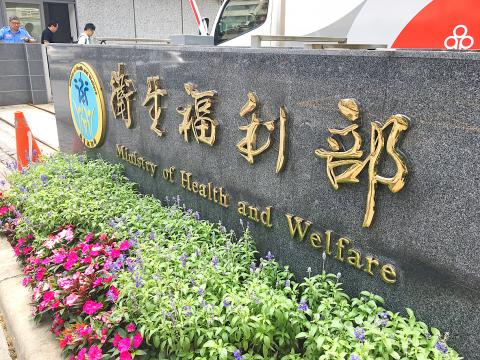More than a dozen computer system servers at hospitals have been attacked by ransomware, the Ministry of Health and Welfare said yesterday.
The ministry issued the statement after Chinese-language reports said that about 56 hospitals nationwide have been targeted by ransomware since Thursday, including ministry-affiliated hospitals, large regional hospitals and clinics.
Hackers used malware to block hospitals’ access to their own information system and asked them to pay in bitcoin within a certain time or face losing files, the reports said.

Photo: Lin Hui-chin, Taipei Times
The reports said that the ministry had reported the cases to the Ministry of Justice’s Investigation Bureau.
Department of Information Management Director Parng I-ming (龐一鳴) said that the ministry received information about a ransomware attack initiated early on Thursday at the ministry’s Taipei Hospital in New Taipei City.
However, the hospital restored the system within two hours and no medical records were leaked, Parng said.
About a dozen other hospitals reported ransomware attacks that were initiated early on Friday, he said, adding that the issues were resolved in one to two hours, no ransoms were paid and no patient information was compromised.
Similar incidents have occurred at hospitals in Taiwan before, with the source of the attacks tracked to eastern Europe, he said, adding that the sources of this week’s attacks have not yet been identified.
The hospitals had password management problems that could be improved, so the ministry has asked them to bolster their information security, he said.
A US survey showed that about one-quarter of ransomware cases targeted healthcare facilities, he added.
Additional reporting by CNA

Taiwanese can file complaints with the Tourism Administration to report travel agencies if their activities caused termination of a person’s citizenship, Mainland Affairs Council Minister Chiu Chui-cheng (邱垂正) said yesterday, after a podcaster highlighted a case in which a person’s citizenship was canceled for receiving a single-use Chinese passport to enter Russia. The council is aware of incidents in which people who signed up through Chinese travel agencies for tours of Russia were told they could obtain Russian visas and fast-track border clearance, Chiu told reporters on the sidelines of an event in Taipei. However, the travel agencies actually applied

Japanese footwear brand Onitsuka Tiger today issued a public apology and said it has suspended an employee amid allegations that the staff member discriminated against a Vietnamese customer at its Taipei 101 store. Posting on the social media platform Threads yesterday, a user said that an employee at the store said that “those shoes are very expensive” when her friend, who is a migrant worker from Vietnam, asked for assistance. The employee then ignored her until she asked again, to which she replied: "We don't have a size 37." The post had amassed nearly 26,000 likes and 916 comments as of this

New measures aimed at making Taiwan more attractive to foreign professionals came into effect this month, the National Development Council said yesterday. Among the changes, international students at Taiwanese universities would be able to work in Taiwan without a work permit in the two years after they graduate, explainer materials provided by the council said. In addition, foreign nationals who graduated from one of the world’s top 200 universities within the past five years can also apply for a two-year open work permit. Previously, those graduates would have needed to apply for a work permit using point-based criteria or have a Taiwanese company

US President Donald Trump said "it’s up to" Chinese President Xi Jinping (習近平) what China does on Taiwan, but that he would be "very unhappy" with a change in the "status quo," the New York Times said in an interview published yesterday. Xi "considers it to be a part of China, and that’s up to him what he’s going to be doing," Trump told the newspaper on Wednesday. "But I’ve expressed to him that I would be very unhappy if he did that, and I don’t think he’ll do that," he added. "I hope he doesn’t do that." Trump made the comments in